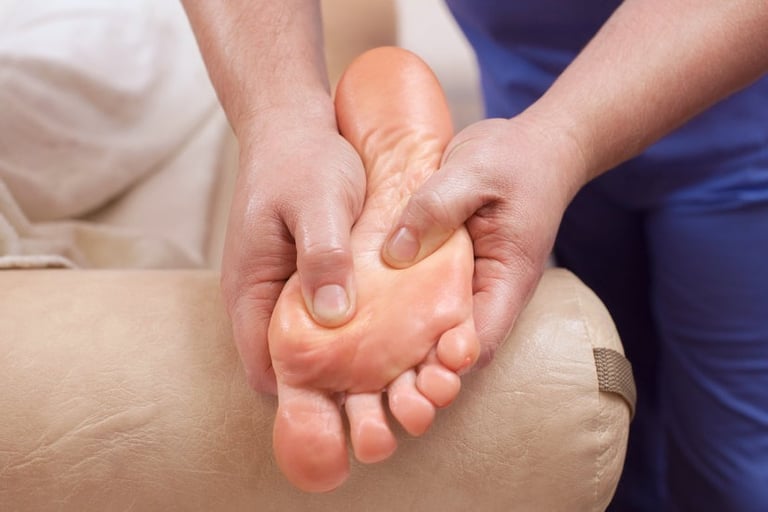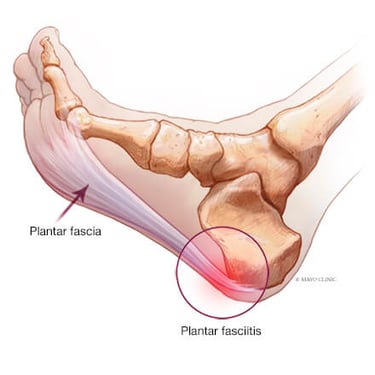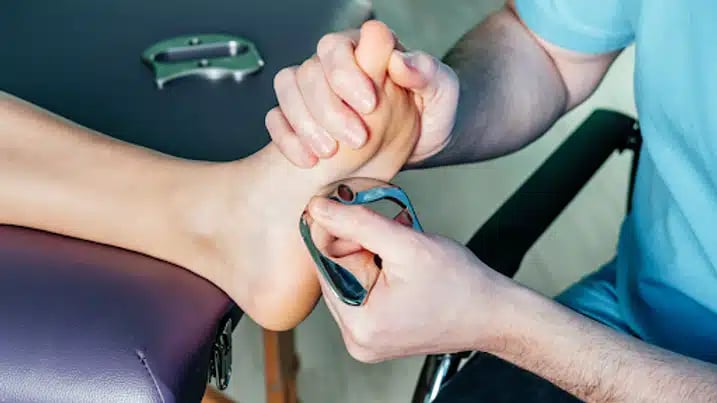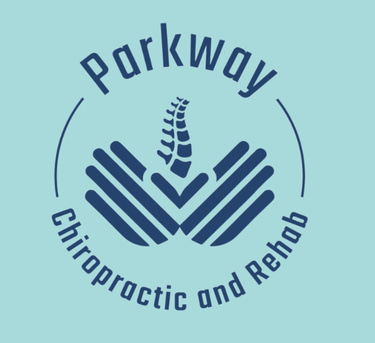Plantar Fasciitis: Relief and Treatment at Parkway Chiropractic and Rehab
Plantar fasciitis is one of the most common causes of heel pain, affecting millions of people each year. It occurs when the plantar fascia, a thick band of tissue that connects the heel to the toes, becomes inflamed due to overuse or strain. This condition can cause sharp, stabbing pain, particularly with the first steps of the morning or after long periods of standing or walking. At Parkway Chiropractic and Rehab, we specialize in providing effective, non-invasive treatment options to help alleviate pain and promote healing for those suffering from plantar fasciitis.
What is Plantar Fasciitis?
Plantar fasciitis is an overuse injury that leads to inflammation of the plantar fascia, the tissue that supports the arch of your foot. This condition commonly occurs when there is increased pressure on the feet, causing microtears in the fascia. Over time, this inflammation can lead to significant pain, especially after periods of inactivity, such as sleeping or sitting.
While plantar fasciitis can affect anyone, it is particularly common among individuals who:
Engage in high-impact activities: Runners, dancers, or athletes who put excessive strain on their feet are more likely to develop plantar fasciitis.
Spend long hours on their feet: People who stand for extended periods, such as teachers, healthcare workers, or retail workers, are at higher risk.
Are overweight: Extra weight can place added pressure on the feet, increasing the risk of plantar fasciitis.
Have poor foot mechanics: Individuals with flat feet, high arches, or improper gait patterns may put undue stress on the plantar fascia.
Plantar fasciitis is typically diagnosed based on symptoms and physical examination, with imaging tests like X-rays or ultrasounds used to rule out other conditions.
Common Symptoms of Plantar Fasciitis
The most characteristic symptom of plantar fasciitis is heel pain. However, it can manifest in several ways:
Sharp Pain in the Heel: Pain is most commonly felt on the bottom of the heel, especially when taking the first steps after getting out of bed or after sitting for a long period.
Pain After Activity: While pain is typically worse in the morning, it can also intensify after long periods of standing, walking, or exercising, especially during high-impact activities.
Tenderness at the Bottom of the Heel: The area where the plantar fascia attaches to the heel bone can be very tender to the touch, especially along the inner aspect of the heel.
Stiffness and Swelling: The heel may feel stiff, and swelling can occur, particularly if the condition has been present for a long time.
The pain from plantar fasciitis can range from mild to severe, and it can interfere with daily activities, such as walking, exercising, and even standing for long periods.
How Chiropractic Care Helps Plantar Fasciitis
Chiropractic care provides a holistic, non-invasive approach to treating plantar fasciitis by addressing both the symptoms and underlying causes of the condition. At Parkway Chiropractic and Rehab, we focus on restoring proper foot function, reducing inflammation, and promoting healing with a combination of techniques tailored to your needs. Here’s how chiropractic care can help:
Spinal and Lower Limb Adjustments
Spinal and lower extremity adjustments are important for improving the overall alignment and biomechanics of the body. Misalignments in the spine or pelvis can contribute to abnormal posture and gait, placing additional stress on the feet. By performing targeted spinal adjustments and adjusting the joints in the lower legs and feet, we can help redistribute pressure, reducing strain on the plantar fascia.
Foot and Ankle Mobilization
Chiropractors use specialized techniques to mobilize the joints of the foot and ankle. Restoring proper movement and flexibility in these joints can reduce tension in the plantar fascia, promote healing, and alleviate pain. Mobilization also helps reduce stiffness, improving overall foot function.
Soft Tissue Therapy
Soft tissue therapies, such as myofascial release, trigger point therapy, and deep tissue massage, can be used to relax tight muscles and fascia around the foot and calf. By relieving muscle tension and addressing areas of irritation, we can reduce inflammation and pain in the plantar fascia. Soft tissue work also helps to increase circulation and promote faster healing of the affected tissues.
Stretching and Strengthening Exercises
Plantar fasciitis is often associated with tight muscles, particularly in the calves, hamstrings, and feet. We provide customized stretching and strengthening exercises to improve flexibility and strengthen the muscles that support the foot and ankle. Stretching the calves and plantar fascia itself can help release tension, while strengthening the foot muscles helps to better support the plantar fascia and prevent future flare-ups.
Orthotic Recommendations
In some cases, chiropractic care may include recommendations for custom orthotics or shoe inserts. These supportive devices help to correct foot mechanics, providing better arch support and cushioning for the heel. Orthotics can reduce stress on the plantar fascia and help prevent the condition from recurring.
Benefits of Chiropractic Care for Plantar Fasciitis
Chiropractic treatment offers several benefits for individuals suffering from plantar fasciitis:
Pain Reduction: Chiropractic care focuses on reducing pain and inflammation in the heel, providing immediate relief for those suffering from plantar fasciitis.
Improved Mobility: Through joint mobilizations, stretches, and soft tissue therapies, chiropractic care can help improve the range of motion in the feet and ankles, making it easier to move and walk.
Prevention of Recurrence: Chiropractic adjustments and exercises can help address the underlying causes of plantar fasciitis, preventing future flare-ups.
Improved Foot Function: By improving the alignment of the spine, pelvis, and lower extremities, chiropractic care can help restore proper foot function, reducing strain on the plantar fascia and supporting long-term healing.
Non-Surgical, Drug-Free Treatment: Chiropractic care provides a safe, natural alternative to medications, injections, or surgery, focusing on healing the body without the need for invasive treatments.
Why Choose Parkway Chiropractic and Rehab for Plantar Fasciitis Treatment?
At Parkway Chiropractic and Rehab, we specialize in providing personalized care for individuals suffering from plantar fasciitis. Our experienced chiropractic team will work with you to create a customized treatment plan that addresses the root causes of your pain and promotes long-term healing. We focus on a holistic approach that includes spinal adjustments, soft tissue therapies, rehabilitation exercises, and lifestyle recommendations to get you back on your feet without the need for surgery or medications.
Comprehensive, Non-Invasive Care
We provide a combination of chiropractic techniques, soft tissue therapies, and corrective exercises designed to alleviate pain, improve mobility, and prevent the recurrence of plantar fasciitis.
Personalized Treatment Plans
Every patient is unique, and we take the time to develop a treatment plan tailored to your individual needs, lifestyle, and goals.
Expert Care for Long-Term Relief
Our goal is not just to relieve your pain but to provide long-term solutions that restore proper foot mechanics, reduce the risk of re-injury, and help you maintain optimal foot health.
Start Your Recovery Today
If you're dealing with plantar fasciitis and want to avoid surgery or long-term dependency on medications, chiropractic care can provide the relief you need. Parkway Chiropractic and Rehab offers personalized, holistic treatment options to help you heal faster and improve your quality of life.
Book your appointment now and take the first step toward a pain-free life, free from the discomfort of plantar fasciitis.






Parkway Chiropractic and Rehab
© 2024. All rights reserved.
⏰ Office Hours
🌟 Monday to Friday:
🕘 9:00 AM – 6:00 PM
🌟 Saturday:
🕘 9:00 AM – 12:00 pm


